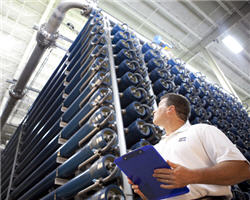USDA scientists and cooperators developed an interactive atlas of wireless plants in Guatemala that are closely related to crop plants, which will make it easier to preserve plants with genes that are vital to global food security.
The European Union (EU) awarded the international Mare Nostrum consortium more than $4 million to find new ways of preserving the Mediterranean Sea and its coastline.
Researchers have discovered a new process that enables natural resource managers to better conserve particular wildlife, plants, and ecosystems as the climate continues to change.
"We've made progress in Alaska, but this is a long-term program that we are pursuing in a safe and measured way," said Marvin Odum, the company's director, Upstream Americas.
WaterNow, a new system launched by the USGS allows anyone to find out the current conditions of thousands of rivers and streams across the country, right from their phones.
The case before U.S. District Judge Carl J. Barbier apparently will go to trial after all. Phase one will determine the causes of the Deepwater Horizon disaster and who should be held responsible.
The Office of Chemical Safety and Pollution Prevention and the U.S. Department of Agriculture will be having a public meeting for those engaged in activities to reduce exposure of honey bees and other pollinators to pesticides.
The FDA has extended the comment period for two draft environmental review documents on the proposed conditions of a new animal drug application (NADA) concerning genetically engineered Atlantic salmon.
According to a new study in the Journal of Phycology, ocean nitrogen caused by pollution and natural sources sparks the growth of toxic phytoplankton species, which is very harmful to marine life and human health.
President Obama's message was clear in his second inaugural address, and he reiterated it when Energy Secretary Dr. Steven Chu announced he will step down soon.
Scientists from the South Dakota University made history this year by retrieving additional ice from the main borehole as part of the West Antarctica Ice Sheet Divide Ice Core project.

Technicians, scientists, engineers, hydrologists, and other types of environmental jobs are increasing faster this decade than the average for all U.S. occupations, in some cases almost twice as fast.
Following the worst oil spill in U.S. history, some question the acceleration of government contracts granted to BP prior to suspension.
The ARS is conducting a new study to discover how microbes in the soil that are carried off by strong winds could lead to finding ways to minimize soil damage that is caused by wind erosion.
Veolia Energy recently held a ribbon-cutting ceremony to commission the two new, natural gas-fired rapid-response boilers, which is part of the company’s multi-million dollar investment in its Philadelphia district energy network to convert it to 100 percent ‘Green Steam’.
The Asia Pulp & Paper Group (APP) has put an end to clearing natural forests in Indonesia, which applies to all suppliers.
Coccolithophores, microscopic ocean algae, provides clues about the effects of climate change that’s happening now and that already happened millions of years ago.
A growing number or coral species have been found to survive in the hottest temperatures, sparking new research to find out just how these corals are beating the global warming odds.
A study published in Conservation Letters this week found that freshwater ecosystems in the Amazon are highly vulnerable to environmental degradation.
More than 200 scientists from over 20 countries around the Mediterranean and Black Seas gathered in Barcelona last week to share the results of their joint work, which summarized on a regional and basin scale the environmental "stressors" on which the scientific research of PERSEUS will focus intensively over the next three years.